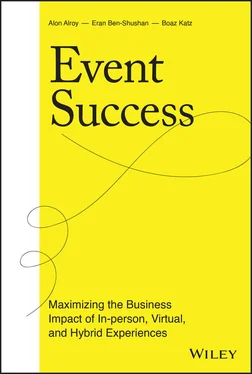Moving forward, event professionals will need to demonstrate a variety of new skills, ranging from hard technical skills to softer skills like empathy and collaboration, while working across multidisciplinary teams. The makeup of the team itself will also need to evolve in order to overcome new challenges, adding new types of expertise that weren't as necessary previously, while reforming some roles that have become obsolete.
Part of this transition will be revisiting and redefining how event teams interact with other teams within their organization.
Engagement is a key attribute of a successful event, but the way in which organizers reach audiences and design experiences for them is undergoing a dramatic transformation. Gone are the days of a captive audience that dedicates multiple days to in-person event attendance by default.
Moving forward, organizers are going to have to get creative in order to pique the interest of an audience that is always one click away from the exit. Event teams are now being challenged by the need to engage audiences that are less likely to attend as many events in person and less likely to dedicate as much time to their events. Key to achieving strong ROE is cracking the code on event engagement in these new formats.
We live in a world where everything can be measured, especially if it takes place in a virtual setting. With new virtual platforms, events are becoming powerful data generators, and the utilization of this data is key to event success. Furthermore, event success and ROI have long been tied to quantitative metrics like attendee and registration numbers, or square footage of exhibition space, rather than qualitative metrics, like engagement, lead generation, and brand affinity. In most other industries, such metrics are seen as vital benchmarks and tools for optimization, for understanding the audiences' needs and habits, and for improving the quality of the product.
As we emerge from the pandemic into an age of virtual and hybrid events, data will begin to play a much bigger role in measuring, optimizing, and ultimately scaling event success. To some, these changes might sound intimidating, but we encourage everyone in the industry to see this evolution for what it is: an opportunity for events to become more purposeful, more impactful, more demonstrably valuable, and more efficient in achieving their stated aims. Though the disruption of the pandemic was a shock to event professionals, we will (and are already beginning to) look back at that moment as a key enabler of innovation in an industry that was in desperate need of change.
1 1The actual title of the chapter was “Why In-Person,” a decision intended to reflect our IN-PERSON content brand and our steadfast belief in the power of in-person experiences. Admittedly, the prospect of virtual events becoming so popular and necessary was very far away at the time.
2 2 https://dev-meetingsmeanbusiness.pantheonsite.io/sites/default/files/OE-EIC%20Global%20Meetings%20Significance%20(FINAL)%202018-11-09-2018.pdf.
CHAPTER 2 Event Success in the Post-COVID-19 Era
The pandemic has changed our very definition of events, and with it comes a new definition of event success. Prior to COVID-19, virtual events were few and far between. They also often failed to offer much of what inspired people to attend events in person. Such events (webinars, webcasts, online conferences, and digital trade shows) were often effective in achieving specific outcomes, but they were hardly considered a viable alternative to the in-person experience.
As the pandemic progressed, however, the industry as a whole made some incredible strides in improving the virtual event experience—progress that will continue well after in-person events resume. Throughout the remainder of 2020 and the first half of 2021, we saw incredible levels of resilience, adaptability, technological adoption, and rapid innovation. While the sudden transition to virtual events posed a lot of challenges, it also offered a range of new opportunities.
Challenges and Opportunities Associated with Virtual Events
According to a study we conducted in 2020, 68 percent of event marketers believe it is more difficult to facilitate networking opportunities when hosting virtual events, 67.7 percent struggled to maintain engagement, and 52.5 percent were challenged by the logistics of virtual events.
Up until this point, our entire industry was built around face-to-face human interaction, whether on stage, on the exhibition floor, or after hours. Organizers faced the immediate challenge of replicating those interactions, and many are still struggling to overcome this. Keeping virtual audiences engaged, especially during a pandemic that forced many to work from home, was especially daunting. Event organizers have long enjoyed the benefits of a captive audience, but suddenly found themselves competing with everything from incoming emails and phone calls to a dog barking or baby crying in the background. Furthermore, event teams are experts at facilitating in-person experiences, from booking venues to managing logistics, but producing a virtual experience often requires different skills and different tools. Despite these challenges, however, both virtual and hybrid events (which contain elements of both in-person and virtual experiences) offer a range of benefits.
According to our research, 60 percent of event professionals pivoted an in-person event to a virtual format as a direct result of the pandemic in 2020. That year, 80 percent of event organizers said they were able to reach a wider audience with virtual events, more than half increased the number of webinars they produced, and 71.5 percent say virtual engagement tools will play a major role in their event strategies moving forward. In fact, 65.5 percent said their budgets will increase, and 93 percent plan to invest in virtual events in the future.
Virtual events are relatively less expensive to produce than their in-person counterparts, and the shift to a virtual format will dramatically increase their reach. They are also powerful data generators, providing valuable insights on attendee engagement patterns, potentially offering clues to buying behaviors.
We at Bizzabo got a first-hand look at both the opportunities and the challenges associated with virtual events at a relatively early stage in the pandemic, and our experience was not unlike others in the events space.
Prior to the pandemic we had hosted a few events of our own—including our IN-PERSON Collective flagship event that took place in New York in December 2019—but the majority of our understanding of events was informed by conversations with our customers and partners in the industry.
As we pivoted toward becoming a virtual events platform in early 2020, we decided to put our new virtual event platform to the test by hosting our own virtual event, which we called (Almost) IN-PERSON.
We sent out invitations to members of the industry in hopes of attracting 500 attendees. Within 24 hours, we had 1,500 registrants. After 72 hours, we reached 5,000. In the end, we had more than 6,000 participants across 70 countries, including representatives from companies like Twitter, Salesforce, and Amazon—the types of brands whose business we had been chasing for years (unsuccessfully, up to that point).
We also received responses from current and prospective investors and most of our biggest clients. We had to figure out a lot for the first time in a very condensed time frame, such as whether virtual events also needed an app (they do) and whether the event should be broadcast live or should rely on prerecorded videos (we did both and learned that attendees definitely appreciate knowing whether or not a session is actually happening live). We experienced a wide array of technical glitches in the days and weeks leading up to the event, as we scrambled to cobble together a viable virtual events platform, but when the moment came, everything went off without a hitch.
Читать дальше












